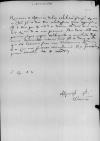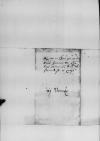List #1958
Ermland (Warmia) Chapter do Ioannes DANTISCUSFrauenburg (Frombork), 1538-11-01
| odebrano [1538]-11-03 Rękopiśmienne podstawy źródłowe:
| ||||
Tekst + aparat krytyczny + komentarzZwykły tekstTekst + komentarzTekst + aparat krytyczny
Reverendissimo in Christo Patri et Domino, domino
Reverentiae et observantiae debita exhibitione praemissa.
Reverendissime in Christo Pater et Domine, domine colendissime.
Quia responsum
Cui nos sinceriter commendamus.
Ex
Eidem Reverendissimae Dominationi Vestrae obsequentissimum


 BCz, 1597, p. 216
BCz, 1597, p. 216